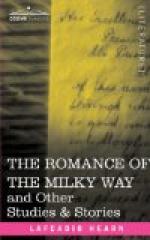[As for (the reason why)
the light of that lamp appears to be
a Weirdness,[63]—perhaps
the oil was expressed from (the nuts
of) the ancient tsu-baki?]
[Footnote 63: Ayashig[’e] is a noun formed from the adjective ayashi, “suspicious,” “strange,” “supernatural,” “doubtful.” The word kag[’e] signifies both “light” and “shadow,”—and is here used with double suggestiveness. The vegetable oil used in the old Japanese lamps used to be obtained from the nuts of the tsubaki. The reader should remember that the expression “ancient tsubaki” is equivalent to the expression “goblin-tsubaki,”—the tsubaki being supposed to turn into a goblin-tree only when it becomes old.]
* * * * *
—Nearly all the stories and folk-beliefs about which these ky[=o]ka were written seem to have come from China; and most of the Japanese tales of tree-spirits appear to have had a Chinese origin. As the flower-spirits and hamadryads of the Far East are as yet little known to Western readers, the following Chinese story may be found interesting.
* * * * *
There was a Chinese scholar—called, in Japanese books, T[=o] no Busanshi—who was famous for his love of flowers. He was particularly fond of peonies, and cultivated them with great skill and patience.[64]
[Footnote 64: The tree-peony (botan) is here referred to,—a flower much esteemed in Japan. It is said to have been introduced from China during the eighth century; and no less than five hundred varieties of it are now cultivated by Japanese gardeners.]
One day a very comely girl came to the house of Busanshi, and begged to be taken into his service. She said that circumstances obliged her to seek humble employment, but that she had received a literary education, and therefore wished to enter, if possible, into the service of a scholar. Busanshi was charmed by her beauty, and took her into his household without further questioning. She proved to be much more than a good domestic: indeed, the nature of her accomplishments made Busanshi suspect that she had been brought up in the court of some prince, or in the palace of some great lord. She displayed a perfect knowledge of the etiquette and the polite arts which are taught only to ladies of the highest rank; and she possessed astonishing skill in calligraphy, in painting, and in every kind of poetical composition. Busanshi presently fell in love with her, and thought only of how to please her. When scholar-friends or other visitors of importance came to the house, he would send for the new maid that she might entertain and wait upon his guests; and all who saw her were amazed by her grace and charm.




